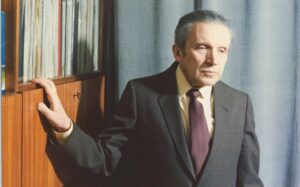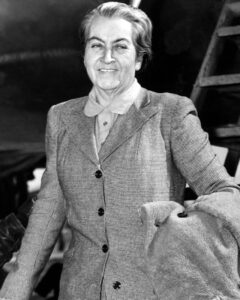For a bunch of scamps kicking each other in the ankles and pulling girls by their pigtails in our primary school, the war was an event as distant as the mission of the Polish Military Contingent in Afghanistan or Adam Małysz’s successes at the Salt Lake City Olympics will one day be for Poles born during the pandemic. The post-war rubble still lying around was brilliant for playing Indians, the sight of war invalids and thirty-year-olds with bodies twisted by rickets was not much of a surprise to anyone and our grandparents preferred to tell us about the good old days before the war. Our teachers and all kind of educators were left to make sure we would not forget what we could not remember anyway. We were fed Cold War propaganda of the “never again” variety each and every step of the way. Every month a grim-looking soldier visited our classroom, showing us horrible slides and instructing us what to do in case of an air raid, explosion of an atom bomb or biological attack. A textbook nuclear shelter was to be found in the school cellar. During Polish lessons we were tormented with stories of child protagonists all being killed by the Gestapo or dying of exhaustion or various diseases in camps. But there was no mention of the Shoah: I still remember the shame, when the headmaster summoned my parents for a serious talk, because as a first-former I had drawn a night sky with six-pointed stars.
I understood everything later. Yet I remained with the belief that during the war, epidemic and famine the world froze as if in a blurred black and white photograph. I was an adult when I ended up in several zones of contemporary conflicts. I realised that even there people were still able to laugh, love, mate and make feasts out of nothing. And that in the past, too, life went back to relative normal in moments of respite from the greatest horrors. This discovery, fairly recent, has helped me survive the current pandemic crisis fairly well. We simply need to find a balance between public safety and relative comfort of our daily functioning. But I could not fathom out one thing: how to raise a newborn child in such a situation? How to muster so much calm, cheerfulness and love to help it begin life without being marked by trauma and yet wiser thanks to the experience of the crisis, brave, resourceful and at the same time sensitive and empathic?
Little Ezra was born before the pandemic. His mother, the Dutch soprano Channa Malkin, had already made her operatic debut as Barbarina in Mozart’s Marriage of Figaro (when she was not yet seventeen) and had appeared in an impressive number of concerts, singing a wide-ranging repertoire, from Baroque music to traditional Sephardic songs. Her name also appeared in the programme of the 100th anniversary Handel Festival in Göttingen, which was to have been one of the highlights of my previous season as a reviewer. The singer contacted me in February 2020 through a mutual acquaintance from Amsterdam: she asked me to help her find the score of a song cycle with music by Mieczysław Weinberg and words by the Chilean poet Gabriela Mistral.
Channa Malkin. Photo: Brendon Heinst
I became intrigued. I did not know the songs. Fairly soon I managed to find out that their opus number was 110 and that they had been written in the year of the coup, when power in Chile, following Allende’s suicide, was seized by a military junta headed by General Pinochet. The songs are missing from the list of Weinberg’s compositions on the website of the Polish Music Information Centre. There is an inexplicable gap between two operas from 1972 and 1975, marked op. 109 and 111 respectively. As I continued to search, I came across contact data of a translator representing an independent music publisher in Hamburg, which had published facsimiles of several dozen of Weinberg’s manuscripts, including the songs to Mistral’s poems. I gave Channa Malkin the addresses and phone numbers, offering to help her further, if the contact data proved useless.
Three weeks later Europe became the epicentre of the pandemic. Public life and the economy froze. One by one cultural institutions cancelled events planned not only for the second half of the season, but also for the following years. I did not go to Göttingen. I did not meet Channa Malkin and did not hear her sing live. Sometimes I would think back to our online conversation, though I did not expect that Malkin’s fascination with Weinberg’s forgotten song cycle would stand the test of time. I was wrong. The next message from the singer came over one year later, in early April. It turned out I had sent her to the right address. Malkin got her hands on the score of the piece she had come across accidently, browsing through the internet during one of her sleepless nights with Ezra, then a year and a half old. What’s more, she spent the months of pandemic isolation preparing a recording featuring compositions by other authors as well. She made the recording with two friends: Artem Belogurov, a pianist and virtuoso of period keyboard instruments, and the cellist Maya Fridman. Malkin promised to send me the recording as soon as it was released.
The CD arrived in late May. Beautifully published, recorded at the Philharmonie Haarlem, in an ultramodern format, Digital eXtreme Definition, for a small label, TRPTK from Utrecht. First, I began to listen: to subtle, emotionally nuanced interpretations highlighting not only the content, but also purely musical assets of the compositions. I became enraptured with Malkin’s light, translucent, technically immaculate soprano, and the attentive, supportive accompaniment of her instrumentalists. Only then did I pay attention to the overall concept of the album. It was like an illumination.
Channa Malkin has called her recording This is not a lullaby. She has dedicated it to her son, but decided to go beyond the common pattern of lulling a child to sleep. Using the pieces included in the recording, she has created a multi-layered, unlikely tale of the experience of childhood and parenthood told by poets not all of whom had children, by composers who put memory, trauma, illness, remorse, motherhood and fatherhood – presented in a broader perspective of human existence on earth – into sound.
Mieczysław Weinberg. Photo: Tommy Persson
Weinberg’s cycle is based on pieces by the Chilean poet from her 1924 collection Tenderness. Gabriela Mistral (1889–1957) was born Lucila Godoy Alcayaga, in the Andean town of Vicuña, in a mixed Indian-Spanish-Basque family. Her father was a teacher as well as an itinerant pallador, a vagrant poet cobbling together verses to mark traditional folk festivities. He left his women for good before Lucila turned three. From that moment the girl was brought up with her stepsister, older by almost a generation, slogging mother, and grandmother seeking solace in religion and feeding her magical local tales and verses from the Psalms of David. At the age of fifteen Lucila decided to become a teacher – following in the footsteps of her absent father and perhaps excessively present sister Emilia. Despite lacking the right qualifications, she began to work as an assistant teacher in Compañia Baja, on the outskirts of La Serena. Soon, in 1904, she made her debut as a poet in the local paper El Coquimbo. Two years later she published in it an article devoted to the painful limitations in the education of Chilean women. She was not yet twenty, when her life broke in two and took a different course or rather courses. First came a tragedy which destroyed her hopes for a happy relationship and motherhood – this was the course of the poet’s first love for the railway woker Romelio Ureta, who committed suicide two years after their engagement, and then of another, just as fatal attraction to a writer friend of hers. The other course led Gabriela Mistral – who coined her pseudonym using the names of her two favourite poets, Gabriele D’Annunzio and Frédéric Mistral – to absolute heights in education, backstage of great politics and in 1945 to the Nobel Prize award ceremony: she won the prize for “her lyric poetry which, inspired by powerful emotions, has made her name a symbol of the idealistic aspirations of the entire Latin American world”. Mistral was the fifth woman to win the Swedish Academy’s literature prize and is still the only female laureate from Latin America.
I keep hearing in my mind the last lines from her poem “We were all to be queens”, which in Doris Dana’s English translation reads as follows: “And our four kingdoms, we said, so vast and great would be, that as certain as the Koran they would all reach the sea.” Gabriela Mistral certainly reached the sea of a barren mother fighting for the welfare of offspring that were not her own: a magical mother finding fulfilment in writing, concerned about the misery of children born of incestuous relationships, abandoned by their fathers, sent by their mothers to brothels, unwanted, living under the shadow of violence, addiction and omnipresent corruption.
Gabriela Mistral. Photo: La Tercera
Weinberg dedicated these sorrowful songs to his daughter Anna. Remembering the experiences of his parents, who after the Kishinev pogrom of 1903 – in which, according to the official tsarist figures, 49 Jews were killed, over 500 were wounded, 700 houses and 600 shops were plundered – decided to move to Warsaw. Remembering his own experiences from 1939, when as the only member of his family he escaped to the East and survived – his father Samuel, mother Sonia and sister Estera stayed in Poland. Having been interned in the Litzmannstadt Ghetto, they ended up in the Trawniki concentration camp near Lublin. They were killed in the infamous Operation Harvest carried out on 3 November 1943 on Himmler’s orders. Channa Malkin was born in somewhat better times, in the family of a Jewish violinist born in the Soviet Tbilisi, who decided to emigrate to Israel when he was studying in Moscow. In Tel Aviv he met his future wife; their joined decision to spent their student gap year in Holland had an impact on their entire life together. They settled in Amsterdam. Josef Malkin worked for over twenty-five years in the legendary Concertgebouw orchestra. He also tried his hand – quite successfully – at composing. Channa Malkin selected five of her father’s songs to Russian lyrics, beginning with a teasing letter of a five-year-old to his mother by Ilya Selvinsky, a Jewish modernist from Simferopol, Crimean, and ending with heartbreaking poems by Boris Rhyzy, a tragic representative of the “lost generation”, people who grew up during the breakup of the Soviet Union, tried to start families, had children and then hanged themselves, drunk, in their own flats.
The album closes with six songs by John Tavener to Anna Akhmatova’s poetry. In an extensive, beautifully written introduction Channa Malkin deftly anticipates questions about what these songs have to do with motherhood. Well, not much, admits the singer. But they do have a lot to do with mothers – looking for an inspiration other than the role imposed on them by love and biology, understanding all too well that their children will one day call them to account not only for their parental care and affection, but also for their lesson in humanity.
There are no benefits in forgetting. There are no benefits in denial, which irrevocably separates consciousness from feelings, from memories, even traumatic ones, from living impulses and desires for the future. The ability to confront pain, to work through pain is an art which we should practice ourselves and instil in our newborn children, especially at a time of crisis. Little Ezra has recently celebrated his second birthday. Little Ezra probably already understands the last verse of Akhmatova’s Lullaby. “Trouble’s coming, trouble’s staying, trouble’s never wane.” But perhaps Ezra will stand up to trouble when he’s grown up. His mother hasn’t told him to close his eyes. She has given him courage to open them to all miseries of the world.
Translated by: Anna Kijak
Link to the source:
https://www.tygodnikpowszechny.pl/kolysanka-dla-matki-168096



